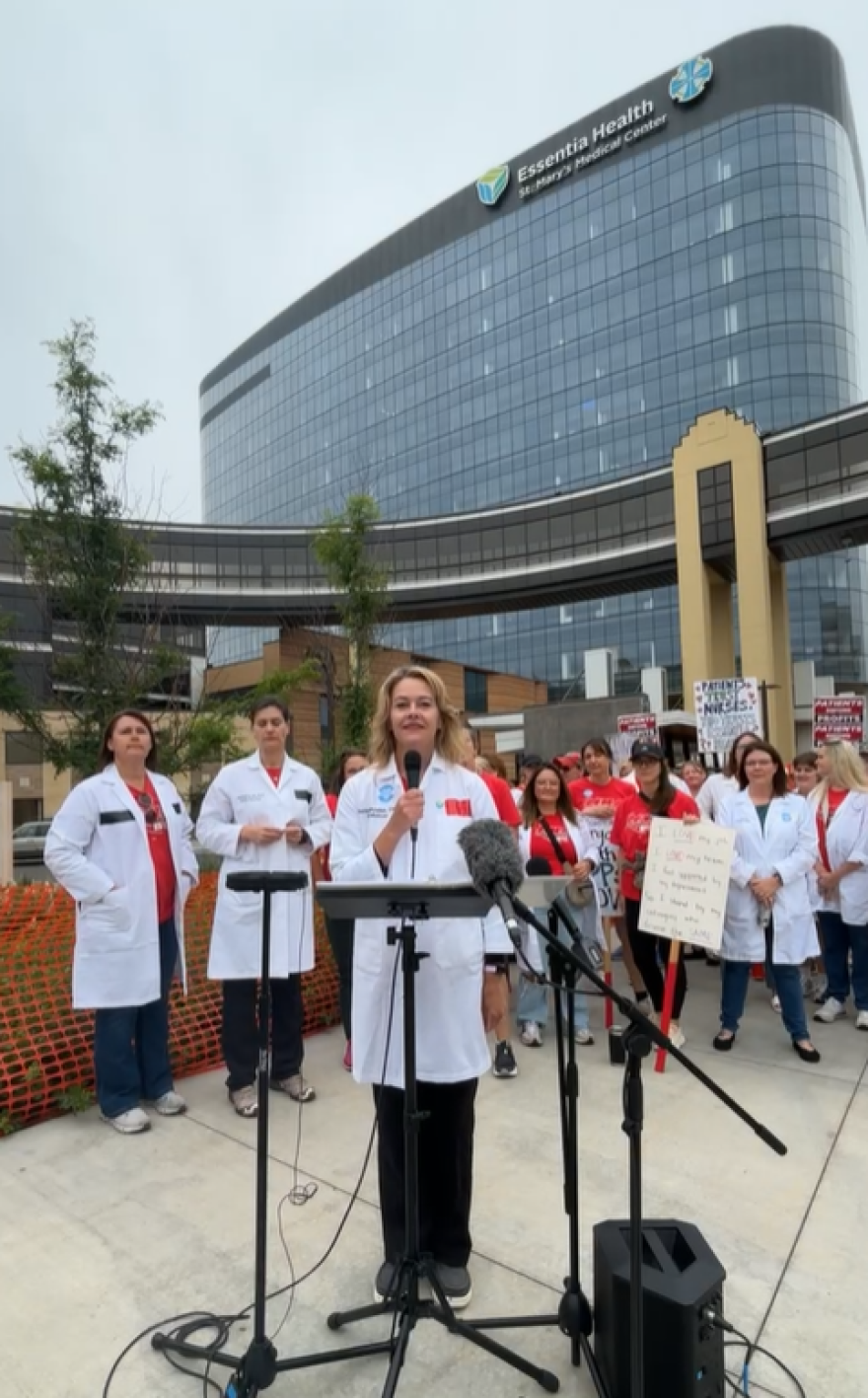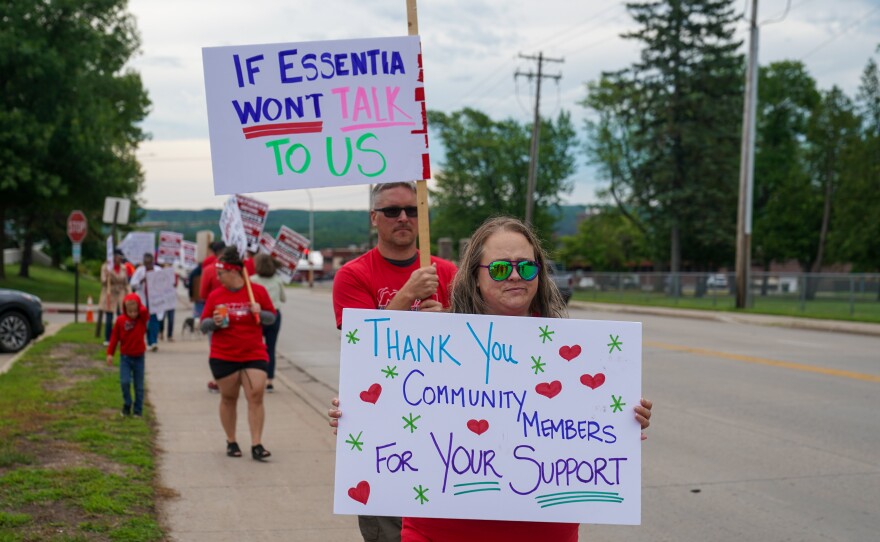DULUTH — Hundreds of clinicians across northeastern Minnesota ended their 13-day strike Tuesday, July 22.
Over 400 advanced practice providers, which include nurse practitioners and physician assistants, are part of the newly formed unit that launched the strike. They work in Essentia Health clinics, hospitals and urgent cares from Brainerd to International Falls to northwest Wisconsin.
The Minnesota Nurses Association, which represents the APPs, said Essentia is refusing to bargain on a first contract for the group. The regional labor relations board certified the bargaining unit last year. Essentia is appealing the certification to the National Labor Relations Board and said negotiating would waive its right to appeal.

MNA said Essentia continues to “stonewall” APPs and calls its actions “unlawful and shortsighted.” The union isn’t withdrawing its unfair labor practice charges, but leaders said the strike brought attention to the issue, and the APPs want to return to their patients.
“This isn’t just an APP issue anymore. It’s a community issue, and it’s a labor issue. It’s about dignity in the workplace for all. And people are paying attention,” said Nerissa Boehm, a nurse practitioner and cardiology specialist in Virginia.
“We’re not giving up, but we are deciding to go back and care for our patients. We care about our patients, and we do not want them to suffer any longer.”
A separate group of nurses in the Twin Ports is also ending its strike after two weeks.
In a news release addressing the end of the strikes, Essentia noted that it did not change its position regarding NLRB review.
“This is great news for our patients, colleagues and the communities who count on us,” said Rhonda Kazik, chief nurse executive, in a news release.
“Throughout often challenging and complex conversations, Essentia’s bargaining team has been dedicated, disciplined and principled in their time negotiating with MNA leadership. We look forward to the shared work ahead to advance our mission to make a healthy difference in people’s lives.”
It also highlighted that two-thirds of APPs continued to work amid the strike.
‘The kind of case that would rise to the top’
APPs who voted to unionize were motivated by a variety of issues, including staffing concerns and nondisclosure agreements.
But it can’t begin to address those issues through a contract if Essentia won’t come to the bargaining table.
That issue — whether Essentia is violating labor law by refusing to bargain with the APPs — is central to the ongoing dispute.
Understanding that means starting with the founding of the National Labor Relations Board in 1935.
The National Labor Relations Act was born amid the uncertainty of the Great Depression, with the hope of providing economic stability, said David Larson, a professor at Mitchell Hamline School of Law and former chair of the American Bar Association Section of Dispute Resolution.
“The phrase that always comes up is industrial peace,” he explained. “The way we can bring industrial peace to the economy is that we can encourage collective bargaining.”
Larson said it would be a “very rare situation” where an employer would not have to bargain after a unit was certified, even if it was challenging the unit.
Essentia has pointed to two cases when appeals courts stated that employers waive their right to challenge a certification if they recognize or negotiate with the union.
But Larson said those are cherry-picked examples, pointing to the well-established purpose of industrial peace through collective bargaining.
“It doesn’t make any sense,” he said. “Because that would be giving you a motivation not to bargain, when the whole purpose of the NLRA is to get you to bargain.”
Larson is not familiar enough with the facts of the case to say what Essentia’s likelihood of winning an appeal would be. But he did note the company would likely be presenting to an employer-friendly National Labor Relations Board.
The NLRB has been without a majority of members or quorum since President Donald Trump fired one of its Democratic members, Gwynne Wilcox, not long after taking office, leaving the five-person board with just two. Wilcox is challenging her firing in court.
Without a quorum, the board can’t issue decisions.
Trump nominated two men to fill vacant Republican seats, but they still need to be confirmed by the Senate, which could take months.
Essentia released a statement after the nominations were announced, saying it marks a step toward the board hearing cases again.
“A full legal review of the proposed APP unit is critically important to the future of patient care,” said Dr. Krista Skorupa, Essentia’s East Market president. “... We look forward to our case being heard and our providers and patients having clarity on a path forward.”
A Republican-majority board likely means another change in who carries the burden of proof in a case like this. Over the last decade, the board has flip-flopped depending on who is president, Larson said.
Under presidents Barack Obama and Joe Biden, the employer had the burden, meaning it was up to them to persuade the board that there is overwhelming evidence to support their argument. During Trump’s first term, the board decided the union had the burden.
“It’s a very high bar,” Larson said.
The union will likely bear the burden to prove that there is a “community of interest” among the APPs, meaning they have similar job duties, pay and working conditions. The regional labor relations board said they did.
But Larson said that may be challenging to prove because of the size and geographic scale of the unit. Essentia has focused on the size and scale, too, highlighting the wide-reaching impacts of a potential strike. Federal rules around the makeup of health care bargaining units are meant to limit those impacts.
Even once the NLRB has a quorum, Larson couldn’t say when it might take up Essentia’s case.
“I don’t know if you can say anything other than the fact that the large geography and the number of workers makes this the kind of case that would rise to the top of the list of things that need to be addressed,” he said.
‘Patients must come first’
MNA said the solidarity of multiple units striking simultaneously brought critical issues to light, galvanized public support and placed rural health care at the forefront of the conversation.
“These caregivers are returning to their patients not in retreat, but with renewed determination to protect the standards of care their communities deserve,” the release stated.
“ ... From clinics to hospital floors, from RNs to APPs, the message is clear: patients must come first.”
The decision to strike was difficult for some APPs, who told KAXE they were saddened by the potential impact on patients.
In most cases, the end of a strike is a concession and an indication that workers realized their demands aren’t as strong as they thought they were, Larson said, but that’s not the case here.
“It’s not because we don’t believe we have a good negotiating position or proper appropriate argument. We’re going back because we care about our patients,” Larson explained. “And we care about our patients even more than we care about ourselves.”
















